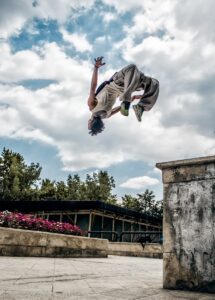Have you ever seen someone do a backflip and thought, “I wish I could do that?” Backflips are not only impressive but also a lot of fun. However, learning how to do a backflip can be intimidating, especially if you’re not an acrobat or gymnast. But fear not, my dear reader! In this comprehensive guide, I will walk you through how to do a backflip step-by-step, so you can impress your friends and family with your newfound talent.
Section 1: The Preparation – How To Do A Backflip
Before attempting a backflip, it’s crucial to ensure you’re physically ready for the challenge. Developing sufficient strength, endurance, and flexibility in your muscles is essential. Start your preparation with some basic stretches, such as lunges, squats, and leg swings. These stretches will warm up your legs, core, arms, and back muscles, preparing them for the intense movement of a backflip. Remember to take your time with these stretches, and don’t rush through them. Proper warm-up and flexibility exercises will minimize the risk of injury and enhance your overall performance.
 Section 2: The Technique
Section 2: The Technique
Mastering the proper technique is fundamental to executing a successful backflip. Start by learning how to tuck and roll properly, as these movements are crucial components of a backflip. Practice a simple jump and tuck, where you jump up and bring your knees toward your chest, then tuck your chin to your chest and roll backward onto your shoulders. This movement will help you get comfortable with the basic mechanics of a backflip.
Continuously practice this move until you feel confident in the tuck and roll. Gradually increase the height and power of your jumps to simulate the motion of a full backflip. Focus on maintaining a tight tuck position and using your core muscles to generate upward momentum. Additionally, consider seeking guidance from a coach or experienced gymnast who can provide valuable feedback and corrections to improve your technique.
Section 3: The Surface – How To Do A Backflip
Choosing the right practice surface is essential for safety and optimal learning. When learning how to do a backflip, always practice on a soft surface, such as a gym mat or a grassy field. Avoid practicing on hard surfaces like concrete or tile, as these can cause serious injuries if you land incorrectly. A soft surface will cushion your fall and provide a safer environment for training. Additionally, practicing on a soft surface will give you more traction when you run or jump, enhancing your stability during the backflip.
 Section 4: The Progression
Section 4: The Progression
As with any complex skill, learning how to do a backflip requires a gradual progression. Start with basic drills to build a strong foundation and gradually work your way up to the full backflip. Begin by practicing against a wall to help you jump higher. Place your hands on the ground and kick your feet up onto the wall, then push off and attempt the flip. This wall-assisted backflip will give you an opportunity to develop the necessary height and rotation while providing a safety net for your first attempts.
After gaining confidence with the wall-assisted backflip, consider using a trampoline to practice the technique in a controlled environment. The trampoline will allow you to focus on perfecting your form and timing without the fear of hard landings. Additionally, having a spotting partner can be immensely helpful during the learning process. A spotting partner can provide physical support and guidance, ensuring you execute the flip correctly and safely.
Section 5: The Mindset – How To Do A Backflip
The right mindset is crucial when learning how to do a backflip. Be patient with yourself; mastering a backflip takes time and practice. Understand that it’s normal to experience some fear and hesitation, but don’t let it hold you back. Stay committed to your goal and practice regularly. Celebrate every small progress, as it’s all part of the learning journey.
Focus on your breathing and stay calm as you execute the flip. Take deep breaths to relax your mind and body before each attempt. Visualize yourself successfully completing the backflip and believe in your ability to do it. Confidence plays a significant role in mastering this skill, but it’s also essential to stay safe and avoid pushing yourself beyond your limits.
 Section 6: Overcoming Fear
Section 6: Overcoming Fear
For many aspiring backflippers, fear can be a significant obstacle to overcome. The idea of flipping backward through the air can be intimidating, and it’s entirely natural to feel scared. However, fear should not discourage you from pursuing your goal of learning how to do a backflip. Instead, use fear as a motivator to approach the skill with respect and caution.
To overcome fear, start with visualization exercises. Close your eyes and visualize yourself performing a perfect backflip with confidence and ease. Familiarize yourself with the feeling of success in your mind. Gradually expose yourself to the movement by practicing drills and progressions. As you build trust in your abilities, fear will subside, and you’ll feel more comfortable attempting the full backflip.
Remember that backflipping is a skill that requires mental and physical preparation. Stay patient with yourself and avoid rushing the process. Surround yourself with a supportive environment, such as fellow enthusiasts or experienced coaches who can provide encouragement and guidance. Embrace the challenge and celebrate each step forward, no matter how small it may seem.
Section 7: Common Mistakes to Avoid – How To Do A Backflip
As you embark on your backflip journey, be aware of common mistakes that beginners often encounter. One common mistake is under-rotating during the flip, which can result in a hard landing on your back. To avoid this, focus on generating enough upward momentum and maintaining a tight tuck position to complete the rotation.
Another mistake is over-rotating, leading to an awkward landing on your feet or even falling forward. Pay attention to your body position and try to maintain control throughout the entire flip. Spot the ground as you approach the landing to ensure you’re in the right position to stick the landing.
Improper jumping technique is another frequent mistake. Remember to use your legs to generate power and height, rather than relying solely on your arms. The arms should be used primarily for balance and guidance during the flip.
Lastly, avoid attempting a backflip without proper supervision or training. The risk of injury increases significantly when practicing without guidance. Seek advice from experienced coaches or gymnasts, and never attempt advanced variations without proper progression and skill development.
Section 8: Perfecting Your Landing
The landing is a crucial aspect of a successful backflip. After executing a flawless flip, you want to land safely and confidently. As you approach the landing, spot the ground and prepare to absorb the impact. Bend your knees and aim to land on the balls of your feet, rolling through the rest of your foot to disperse the force evenly.
Maintain a soft, controlled landing, avoiding a stiff or locked position that could lead to injury. As you gain more experience, work on sticking the landing with precision, so you come out of the backflip seamlessly. Consistent practice will help you refine your landing technique and improve your overall performance.
In conclusion, learning how to do a backflip is a challenging yet rewarding journey. With the right preparation, technique, surface, progression, and mindset, you can conquer this impressive acrobatic feat. Always prioritize safety, and never attempt a backflip if you feel unprepared or uncertain. Remember, practice makes perfect, so dedicate time and effort to refining your backflip technique. Happy flipping!
Leave a Reply